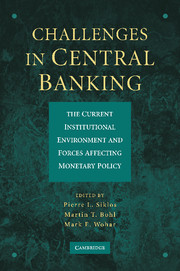 Challenges in Central Banking
Challenges in Central Banking Book contents
- Frontmatter
- Contents
- List of Tables, Figures, and Appendices
- List of Contributors
- Preface
- 1 The State of Play in Central Banking and the Challenges to Come
- PART I PAST, PRESENT, AND FUTURE IN THE CONDUCT OF MONETARY POLICY
- PART II THE SCOPE OF CENTRAL BANKING OPERATIONS AND CENTRAL BANK INDEPENDENCE
- PART III TRANSPARENCY AND GOVERNANCE IN CENTRAL BANKING
- 9 The Economic Impact of Central Bank Transparency: A Survey
- 10 How Central Banks Take Decisions: An Analysis of Monetary Policy Meetings
- 11 Institutional Rules and the Conduct of Monetary Policy: Does a Central Bank Need Governing Principles?
- Index
11 - Institutional Rules and the Conduct of Monetary Policy: Does a Central Bank Need Governing Principles?
Published online by Cambridge University Press: 06 December 2010
- Frontmatter
- Contents
- List of Tables, Figures, and Appendices
- List of Contributors
- Preface
- 1 The State of Play in Central Banking and the Challenges to Come
- PART I PAST, PRESENT, AND FUTURE IN THE CONDUCT OF MONETARY POLICY
- PART II THE SCOPE OF CENTRAL BANKING OPERATIONS AND CENTRAL BANK INDEPENDENCE
- PART III TRANSPARENCY AND GOVERNANCE IN CENTRAL BANKING
- 9 The Economic Impact of Central Bank Transparency: A Survey
- 10 How Central Banks Take Decisions: An Analysis of Monetary Policy Meetings
- 11 Institutional Rules and the Conduct of Monetary Policy: Does a Central Bank Need Governing Principles?
- Index
Summary
Abstract
This chapter suggests that good governance should enhance the trustworthiness of a central bank. Trust is determined by the performance of a central bank over time and is estimated by the absolute value of accumulated inflation surprises. The latter is estimated for a cross-section of over 100 countries. The empirical evidence reveals that all principles of good governance matter, and that no single indicator of central bank behavior, such as its autonomy, suffices to explain inflation performance. Moreover, there is no unique combination of good governance principles that works for every single country. Institutional and socioeconomic differences across countries mean that one size does not fit all.
Introduction
As the 1990s began, the movement to grant either de facto or de jure central bank autonomy gathered speed, prompted in part by the view that there was a correlation but not, as it turns out, causation between inflation and central bank independence. There was an even weaker relationship between real economic growth and central bank independence (Alesina and Summer 1993; Forder 2005). Figure 11.1 plots the relationship between average inflation for the years 1990–2004 in over 100 countries against an index of central bank autonomy that is comparable, though not identical, to the many indicators that have been published over the past several years (e.g., see Cukierman 1992; Siklos 2002, Chapter 6 and references therein). No clearly identifiable negative relationship between these two variables is apparent.
- Type
- Chapter
- Information
- Challenges in Central BankingThe Current Institutional Environment and Forces Affecting Monetary Policy, pp. 357 - 392Publisher: Cambridge University PressPrint publication year: 2010


